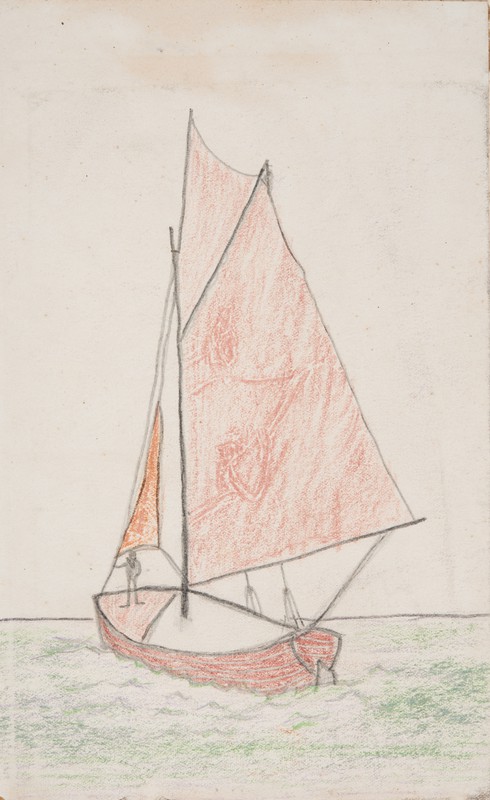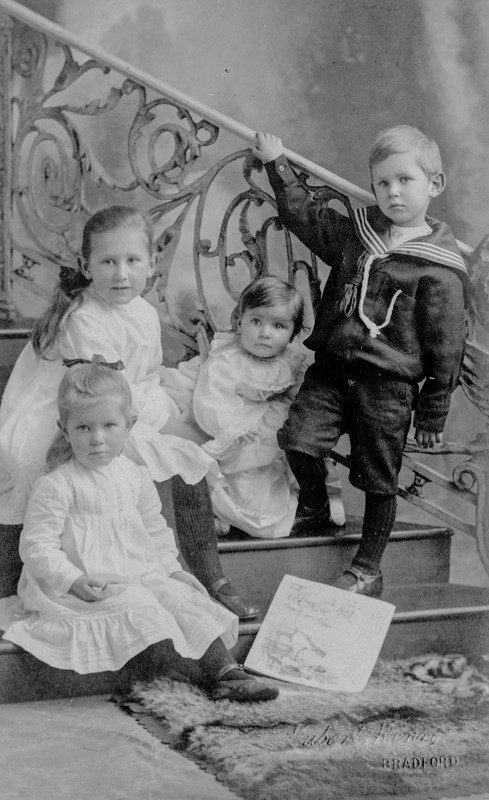The rowing boats on the lake all had names on the prow and on the back rest of the seat in the stern which had quite florid iron work as part of its construction. These boats were hired out mostly to young men and their girls. Girls did not row in those days but sat in the stern making an effort to understand the steering rudder and usually pulling the wrong strings in a crisis. Then they sulked and lay back dangling their hands in the water.
But the motor launch was a magnificent sight with flags flying at prow and stern. It had red cushions all the way round its seats. The brasswork was highly polished and it had an awning in hot weather. We were sometimes allowed to have a penny ride in the launch. The shape of the space inside between the wooden grids on the floor and the awning above with reflected light coming from the water on to our faces, and the unusual view of the landscape seen as a panorama passing and unfolding before our eyes, was enhancing and almost dreamlike. The lapping of the water against the sides and the gentle chugging of the motor in its mahogany cabinet made me drowsy as if in the South Sea Islands. But the dream was all too short and we found ourselves back again at the boathouse with more passengers waiting to embark. In the winter the boats were stored away; all looked sad, the leaves from the trees falling in the water which looked black and uninviting.
The culmination of the Lake Saga was a surprise. I must have been twelve years old and it was the last day of the summer holidays. I was to return to that hateful boarding the next day. Mother was always sympathetic and understood my feelings. She sometimes took me to the cinema if there was anything suitable on. These were the only times we went to the pictures and I remember it was on one of these occasions that I saw my first Charlie Chaplin film. It was fun while it lasted but coming out of the picture palace into daylight and seeing everything going on as usual and then remembering tomorrow, the reaction was almost unbearable.
But today for some reason Mother came for a walk with me and we went into the Art Gallery but even these pictures could not alleviate the gnawing pain at the back of my mind. It was then my Mother said, 'Let's go on the Park Lake!'
I was amazed. We walked round the Gallery and saw those grim doors at the back where pictures were taken in and out. We glanced up at the fossilised tree stump (that mysterious thing which demonstrated something almost incomprehensible about the real age of the world) and so down to the Lake, the boats lying there golden in the late summer sun. But now the great surprise took place. Mother booked tickets for a rowing boat not the motor launch! I kept wondering, 'Is this real? Am I dreaming?' I found myself carefully balancing as I got into the rowing seat. Mother looked so happy and almost mischievous in the stern. I fitted the oars into the rowlocks and then the boatman pushed us off. What a moment! I pushed my hands forward keeping my elbows well down and then dipped the oars in the water. The weight on the boat carried them gently back and I felt the delicate balance of the curved blades, raised them gently without splashing Mother and dipped again, pulling a bit this time, and that wonderful sound of water lapping against the bows came to my ears. I was in my element! I found to my astonishment that I could row quite naturally and even began turning my wrists so as to feather on the back stroke. Mother was delighted. I can see her in her straw hat with the flowers and cherries on it, smiling her approval and pleasure. Through a flash of inspiration on her part I was taking her out for a treat and in doing so had almost trespassed on manhood.
I had discovered I could do something with skill and judgement. Perhaps that was the nearest I came to going back to school happy. At any rate I would have something to tell the boys even if I might have to exaggerate the size of the boat, whip up a bit of a storm and perhaps give the idea that I was alone in my battle with the elements!

